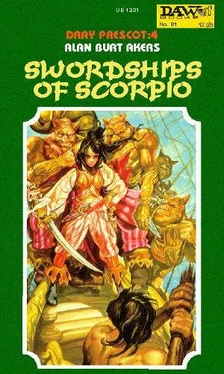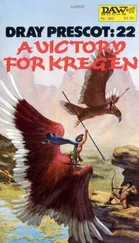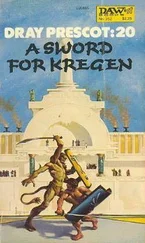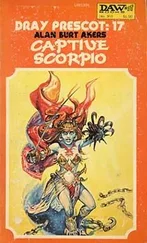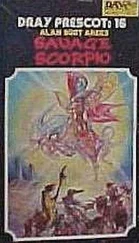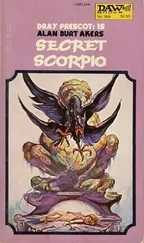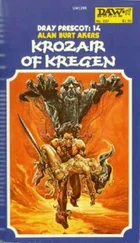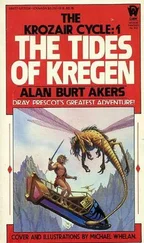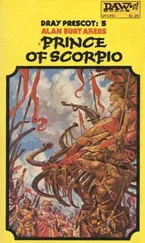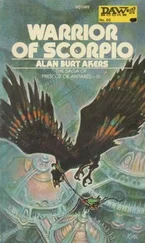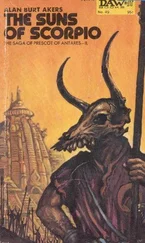Alan Akers - Swordships of Scorpio
Здесь есть возможность читать онлайн «Alan Akers - Swordships of Scorpio» весь текст электронной книги совершенно бесплатно (целиком полную версию без сокращений). В некоторых случаях можно слушать аудио, скачать через торрент в формате fb2 и присутствует краткое содержание. Жанр: Героическая фантастика, на английском языке. Описание произведения, (предисловие) а так же отзывы посетителей доступны на портале библиотеки ЛибКат.
- Название:Swordships of Scorpio
- Автор:
- Жанр:
- Год:неизвестен
- ISBN:нет данных
- Рейтинг книги:5 / 5. Голосов: 1
-
Избранное:Добавить в избранное
- Отзывы:
-
Ваша оценка:
- 100
- 1
- 2
- 3
- 4
- 5
Swordships of Scorpio: краткое содержание, описание и аннотация
Предлагаем к чтению аннотацию, описание, краткое содержание или предисловие (зависит от того, что написал сам автор книги «Swordships of Scorpio»). Если вы не нашли необходимую информацию о книге — напишите в комментариях, мы постараемся отыскать её.
Swordships of Scorpio — читать онлайн бесплатно полную книгу (весь текст) целиком
Ниже представлен текст книги, разбитый по страницам. Система сохранения места последней прочитанной страницы, позволяет с удобством читать онлайн бесплатно книгу «Swordships of Scorpio», без необходимости каждый раз заново искать на чём Вы остановились. Поставьте закладку, и сможете в любой момент перейти на страницу, на которой закончили чтение.
Интервал:
Закладка:
We discovered that it was taboo for Inch to eat the tiny and delicious fruit called squishes and Pando took a fiendish delight in bringing in great baskets of them from the orchards, for they were in season, and leaving heaping bowls of them everywhere in The Red Leem. Inch doted on squishes. This convinced me that his taboos differed radically from what is considered a taboo on Earth; there, had the squishes been taboo, he would never have eaten one in the first place. As it was, whenever we came upon Inch standing on his head, his face expressing the greatest anguish, we knew he had broken his taboo and gone munching squishes.
And Pando, the imp of Sicce, would laugh.
“I wonder, Dray,” he said to me, very solemnly, with Inch on his head in a corner close by. “If I had to stand on my head every time I ate vosk-pie, would I go off vosk-pie?”
“Such gratitude!” said Inch, and succulent squish juice dribbled down into his eye.
“Stick to palines, Inch,” I said. “There is nothing more sovereign.”
He groaned, and shut his eye, thus winking at us when he had nothing in his head to warrant a merry wink — at all.
The time was fast approaching when the armada might be expected in from Pandahem and the caravans would be loading again and Naghan the Paunch would be hiring guards. Due to the depredations of pirates — call them corsairs, rovers, buccaneers, privateers, as you will, to honest sailor-men of Kregen they were renders all — abroad on the outer oceans ships tended to sail whenever they could in great convoys called armadas. I heard Naghan shaking his chins and his paunch and saying, “The swordships make life hard for a merchant, may Armipand drag ’em down by the short and curlies. I sometimes make myself remember, when my caravan is attacked, that I am lucky not to be a ship’s captain.”
“Come now, Naghan!” I protested, out of my ignorance. “Surely the Sunset Sea and the Cyphren Sea do not harbor so very many swordships?”
“Enough and to spare, Pandrite rot ’em!”
Well, I had been to Segesthes and I was now in Turismond; but I had never traversed the seas that lay between.
When the bells began to ring and the people streamed out of their houses and ran in wild excitement down to the harbor you may be sure that Pando was well up with the leaders and I not far behind. Everyone looked out over the sea, toward the southeast and a great cry went up when we saw that armada of sails.
The commotion and seething rushes, the fluttering scarves, the hats tossed into the air, the cheering, the ringing of bells, the frenzied scamperings of children and the mad gyrations of dogs through the crowds, the gusts of happy frothy laughter — all were prodigious.
With a somewhat more cynical eye, I, an old sailorman, looked at that distant white-glinting armada of sails, and the sea between, and felt the wind, and I remembered days hanging around in the Downs, and said to Pando, “I am thirsty, Pando, and am going back to The Red Leem for a drink.”
“But the fleet, Dray! You’ll miss the ships!”
“They will still be in the offing when I return, never fear.” He wouldn’t budge. “If you fall in,” I told him,
“apart from realizing that I told you so, swim to the steps and take your time. The seawall breaks the force of the waves.”
After I had sunk a couple of glasses of the local red biddy — not for me the best of Jholaix when I needed every ob — Inch joined me and we strolled back to the harbor. I was surprised. The first ship was already entering the stone-built entrance past the pharos, gulls swinging whitely about her three masts, her sails coming down, her crew gathering on her forecastle with ropes. A band was playing and the music lolloped into the air as this broad-beamed ship lolloped through the sea. I studied her lines critically.
The Pandaheem called these high-charged ships of the outer oceans argenters. They were rigged with square sails; had they been rigged with lateens they would have looked remarkably like caravels, with their high forecastles and their half decks, quarterdecks and sterncastles. As was to be expected they were decorated lavishly with much gilding and carving, fine gingerbread work that glittered in the opal glare.
They were broad in relation to their length, solid, heavily-built, comfortable ships — and, therefore, slow. They carried courses and topsails on their fore and mainmasts, and courses — a crossjack — on their mizzens, with a spritsail on the bowsprit. I gained the impression, watching the argenters glide solidly and squarely into port, of rolling argosies of sail, dependable, unimaginative, lofty as to hull, cautious as to sail area and plan.
As you know it has been my custom not to jump about in this narrative but, rather, to attempt to tell you of what happened to me on Kregen beneath Antares in as good a chronological order as I can contrive. Maybe that skyjacking has loosened up my time-sense. I will, therefore, quickly say that when I — at last, at long last! — saw the ships of Vallia I saw immediately how like galleons they were. And I mean a real galleon, the type of ship invented by the English: low, streamlined, fast, daringly sparred, superb sailers. Despite the plethora of names the Vallians use for their ships I have always thought of Vallian ships as galleons, and will so refer to them when the time in this narrative is ripe. By contrast — and I thought of it then, as I stood with Pando and Inch and saw the Pandahemic argenters without knowledge of the Vallian galleons — these ships of this armada sailing into Pa Mejab were reminiscent of Portuguese and Spanish caravels and carracks. Maybe history does repeat itself, even though it takes place on different worlds separated by four hundred light-years of interstellar space. To finish this anachronistic comment, the reason — or one of them — why I could never seem to catch a Vallian ship on the inner sea lay simply in the galleon’s superb ability to drive on in wind that would have overset a swifter in a trice.
As well as varters — the ballistae as used by swifters of the inner sea — these ships carried catapults powered by many twisted strands of sinew and hair. Watching critically the evolutions of the ships as they lost way, brought their canvas in, dropped their hooks, and swung to, I was reasonably satisfied that they were seamanlike enough. They were not in a hurry. The reason they had gained the mouth of the harbor before I had expected was explained by their use of sweeps thrust through a few ports cut in their sides. People around me commented on this, giving as their judicious opinion that great news was carried aboard the ships, for using the sweeps meant hard work, and the Tomboramin only worked hard when a definite end lay in view.
The wind was free, was it not, dom? So why sweat at the oars?
If these men were in a hurry — I shuddered to think what their customary seamanship would be like. With the taking in of the fore and main courses disappeared the huge and gorgeously painted devices of Tomboram. Tomboram proudly flaunted the pictured representation of a quombora, a mythical monster of devilish aspect, with much fangery and toothery and clawery, spitting flames and smoke, as her symbol. The fore and main topsails carried the painted devices of the individual ships and owners. Many bright blue flags fluttered.
A swarm of boats put off to the ships, and the first pair were being warped alongside the jetty to begin unloading. The show was over. My next and most immediate plan was somehow to arrange a passage on one of those ships when she returned to Pandahem. I would have to sign on before the mast. That procedure must — given the physical facts of sailing-ship travel in relatively primitive ships across many dwaburs of open ocean — entail prodigious suffering and discomfort which meant nothing, of course, beside my determination to seek out Delia.
Читать дальшеИнтервал:
Закладка:
Похожие книги на «Swordships of Scorpio»
Представляем Вашему вниманию похожие книги на «Swordships of Scorpio» списком для выбора. Мы отобрали схожую по названию и смыслу литературу в надежде предоставить читателям больше вариантов отыскать новые, интересные, ещё непрочитанные произведения.
Обсуждение, отзывы о книге «Swordships of Scorpio» и просто собственные мнения читателей. Оставьте ваши комментарии, напишите, что Вы думаете о произведении, его смысле или главных героях. Укажите что конкретно понравилось, а что нет, и почему Вы так считаете.
